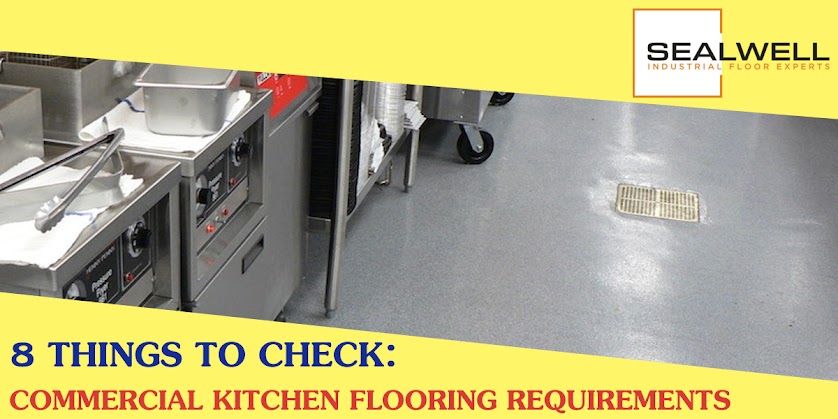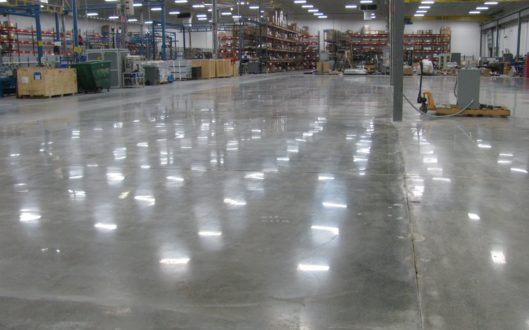Commercial Kitchen Flooring Requirements: 5 Things To Check
Choosing the right commercial kitchen flooring is essential to keeping your facility clean and sanitary. You want to make sure that it's easy to maintain, durable, and slip-resistant. If you want to see if your flooring is right, considering remodeling your work kitchen or just want to keep in the know of the important aspects of your job.
Here are the commercial kitchen flooring requirements: 5 things to check.
Non-Porous
Choosing the best non-porous commercial kitchen flooring requires some knowledge and research. These floors must be durable enough to withstand wear and tear and must be easily cleaned. In addition, they must meet health code requirements and legal regulations. Fortunately, the RX Food safe Flooring System meets HACCP International standards.
Typical commercial kitchens are busy and require flooring that can withstand heavy foot traffic. This can include dropping heavy pans and pouring hot water on the floor. In addition, the equipment in these kitchens produce a lot of heat and grease. These factors create hazards.
Urethane concrete is a good option for commercial kitchens because it can handle a lot of wear and tear. It is also slip resistant. Urethane concrete can be grout coated to provide a non-slip service. This is especially important in commercial kitchens where utensils tend to slip off counters.
Slip-Resistant Flooring and Safety Equipment
Choosing the right commercial kitchen flooring is essential for a sanitary and safe working environment. This is especially important in restaurants, where employees spend a lot of time on their feet. It can also mitigate workplace injuries.
There are a variety of commercial kitchen flooring materials, including tile, concrete, resin, and rubber. Each has its own pros and cons. The right flooring for your restaurant kitchen should be water and slip resistant, durable, and easy to clean.
Keeping your kitchen floor clean is important, as it can help prevent the growth of bacteria. A number of commercial flooring types also come with anti-microbial finishes. Keeping your floor clean can help prevent mold from spreading, and reduce the stress on joints. If you're looking for a durable and slip-resistant commercial kitchen floor, epoxy flooring might be a good choice. Epoxy is applied as a liquid that hardens into a sanitary, seamless surface. The epoxy contains additives to help increase slip resistance.
Also read about, The Importance Of Surface Preparations For Epoxy Flooring Installations
Easy to Clean and Hygiene
Keeping your kitchen floors clean is important for health and safety. Not only does it reduce the risk of slipping and falling, but it can also help improve your bottom line. Commercial kitchen floors are often exposed to grease and other forms of dirt. The easiest and most effective way to keep your kitchen floors looking their best is to use the right cleaning solutions. A good floor cleaner will emulsify grease and bring the luster back to your tile.
Aside from keeping your kitchen floors clean, a floor drain can help reduce slip and fall risks. Proper sloped floors prevent standing water. You can also install rubber mats for additional comfort. For the best results, it's best to use a commercial-grade floor cleaner. These solutions are specially formulated for kitchen floors. Some contractors also offer top coats to prevent bacterial growth.
Durable
Choosing durable commercial kitchen flooring is essential for ensuring that your kitchen runs efficiently and safely. Your floors should be slip-resistant and resistant to chemicals and water, to minimize potential injuries. You also want to keep microbial growth to a minimum, as a commercial kitchen can be a breeding ground for bacteria.
Commercial kitchen floors must be durable to withstand heavy foot traffic, spills, and chemical fumes. Choosing the right material will minimize your maintenance costs. Vinyl is a popular material for commercial kitchen floors. It is easy to install and clean, and is resistant to stains and spills. It also has a thin surface that does not need padding. Another option is epoxy flooring. It is antimicrobial, chemical resistant, and can withstand a great deal of wear and tear. However, epoxy resin flooring is sensitive to heat, and it may crack under pressure. It can also be hard to repair or replace.
Optimized For Sanitation
Choosing the right commercial kitchen flooring can be a daunting task. There are many factors to consider, from the materials used to the design. The bottom line is that you need a floor that will provide a hygienic, safe, and easy to clean surface.
The best way to ensure that you have the perfect kitchen floor is to use a professional flooring service. They can test concrete and install floors in a way that will avoid any moisture issues. They can also apply special finishes and decals. They can also repair existing floors. In general, the best floor to choose for your kitchen is one that has a seamless design. This will allow for easy cleaning and prevent water from standing on the floor. You will also want a floor that is resistant to humidity and heat.
Non-Porous
Choosing the best non-porous commercial kitchen flooring requires some knowledge and research. These floors must be durable enough to withstand wear and tear and must be easily cleaned. In addition, they must meet health code requirements and legal regulations. Fortunately, the RX Food safe Flooring System meets HACCP International standards.
Typical commercial kitchens are busy and require flooring that can withstand heavy foot traffic. This can include dropping heavy pans and pouring hot water on the floor. In addition, the equipment in these kitchens produce a lot of heat and grease. These factors create hazards.
Urethane concrete is a good option for commercial kitchens because it can handle a lot of wear and tear. It is also slip resistant. Urethane concrete can be grout coated to provide a non-slip service. This is especially important in commercial kitchens where utensils tend to slip off counters.
Slip-Resistant Flooring and Safety Equipment
Choosing the right commercial kitchen flooring is essential for a sanitary and safe working environment. This is especially important in restaurants, where employees spend a lot of time on their feet. It can also mitigate workplace injuries.
There are a variety of commercial kitchen flooring materials, including tile, concrete, resin, and rubber. Each has its own pros and cons. The right flooring for your restaurant kitchen should be water and slip resistant, durable, and easy to clean.
Keeping your kitchen floor clean is important, as it can help prevent the growth of bacteria. A number of commercial flooring types also come with anti-microbial finishes. Keeping your floor clean can help prevent mold from spreading, and reduce the stress on joints. If you're looking for a durable and slip-resistant commercial kitchen floor, epoxy flooring might be a good choice. Epoxy is applied as a liquid that hardens into a sanitary, seamless surface. The epoxy contains additives to help increase slip resistance.
Also read about, The Importance Of Surface Preparations For Epoxy Flooring Installations
Easy to Clean and Hygiene
Keeping your kitchen floors clean is important for health and safety. Not only does it reduce the risk of slipping and falling, but it can also help improve your bottom line. Commercial kitchen floors are often exposed to grease and other forms of dirt. The easiest and most effective way to keep your kitchen floors looking their best is to use the right cleaning solutions. A good floor cleaner will emulsify grease and bring the luster back to your tile.
Aside from keeping your kitchen floors clean, a floor drain can help reduce slip and fall risks. Proper sloped floors prevent standing water. You can also install rubber mats for additional comfort. For the best results, it's best to use a commercial-grade floor cleaner. These solutions are specially formulated for kitchen floors. Some contractors also offer top coats to prevent bacterial growth.
Durable
Choosing durable commercial kitchen flooring is essential for ensuring that your kitchen runs efficiently and safely. Your floors should be slip-resistant and resistant to chemicals and water, to minimize potential injuries. You also want to keep microbial growth to a minimum, as a commercial kitchen can be a breeding ground for bacteria.
Commercial kitchen floors must be durable to withstand heavy foot traffic, spills, and chemical fumes. Choosing the right material will minimize your maintenance costs. Vinyl is a popular material for commercial kitchen floors. It is easy to install and clean, and is resistant to stains and spills. It also has a thin surface that does not need padding. Another option is epoxy flooring. It is antimicrobial, chemical resistant, and can withstand a great deal of wear and tear. However, epoxy resin flooring is sensitive to heat, and it may crack under pressure. It can also be hard to repair or replace.
Optimized For Sanitation
Choosing the right commercial kitchen flooring can be a daunting task. There are many factors to consider, from the materials used to the design. The bottom line is that you need a floor that will provide a hygienic, safe, and easy to clean surface.
The best way to ensure that you have the perfect kitchen floor is to use a professional flooring service. They can test concrete and install floors in a way that will avoid any moisture issues. They can also apply special finishes and decals. They can also repair existing floors. In general, the best floor to choose for your kitchen is one that has a seamless design. This will allow for easy cleaning and prevent water from standing on the floor. You will also want a floor that is resistant to humidity and heat.
Reference Url, https://bit.ly/3gWZTqG




Comments
Post a Comment